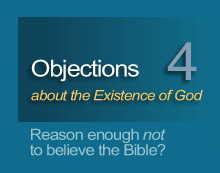WHY THIS?
As one begins to consider the cosmos, and whether or not a divine Creator was involved, is it improper to proceed from the premise that God might exist?
Is the only allowable premise one that says God does not exist?
"You can't start with the hypothesis that God exists."
RESPONSE:
While it is not necessary in the study of the Bible's authenticity to start with the premise "God exists" (example), it is needlessly restrictive to start with the premise "God does not exist", as some atheists might. God's possible existence or non-existence, if not to be accepted as a premise, can or should be the result of logical reasoning, not the presupposition through which one filters the evidence.
In logic, what you believe to be true in the beginning has a direct effect on what you conclude in the end (much discussed here). As this concerns the Bible, if you start with a belief that there is no God that could have inspired its authors, performed its works, or appeared as Jesus Christ, then your conclusion of the evidence - any evidence - is fixed regardless. The Bible is not inspired, is mythological in its records, and Jesus was not divine.
Quite the opposite of what I'd describe to be freethinking, a restrictive premise is not free to follow evidence in search of truth wherever the evidence may lead. It instead channels reasoning into a predetermined route guaranteed from the start to arrive at atheism. Only a premise that allows more than one possible conclusion is free to arrive at truth on its on merit. Otherwise, it doesn't take a prophet to foresee what conclusion on the Bible will likely be reached if one's premise is "God does not, cannot exist".
One worthy reader commented on my observation that science cannot rule out a possible Creator by noting, "It also can't rule out that in a parallel universe the pancakes have eyes." Note: that is a statement that is 'not proven'. Here, by contrast, is something that is 'not unproven' (a slight but important difference): "If a parallel universe exists, pancakes might or might not have eyes."
The latter statement avoids the fallacy of assuming certain facts not in evidence, whereas the former assumes a great deal (obviously excepting that both assume pancakes in alternate universes). I don't know about pancakes in alternate universes, therefore I cannot pretend to be certain of their characteristics. However, I will be open to their possibility, worrying about them in proportion to the evidence I'm shown for their likelihood. Should not atheists at least grant the same for God?
See also:
The cosmological argument for God
Faith: the foundation of logic



Expanded!